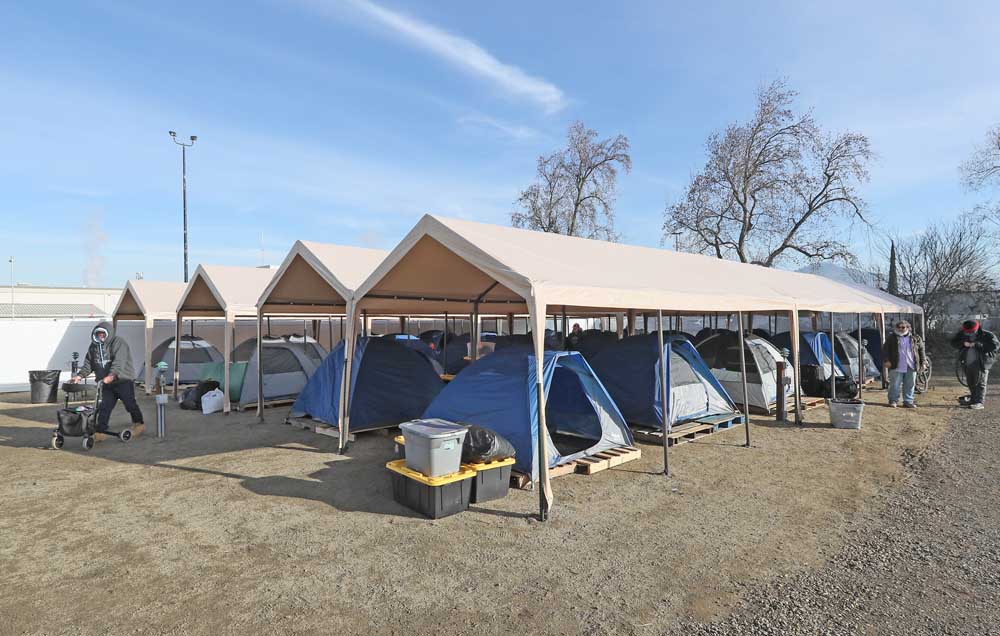‘We are celebrating’: Jackson County shatters Gov. Kotek’s 1-year shelter, rehousing goals
Published 2:15 pm Wednesday, January 10, 2024

- Rogue Retreat Crossings on West McAndrews Road replaced what was formerly known as Medford's urban campground, and started moving people to the new location in early December. The Crossings has capacity to shelter more than 150 people.
By double-digit percentages, Jackson County surpassed every metric within its part of the governor’s unprecedented homelessness emergency order.
Trending
Gov. Tina Kotek on her first day in office gave seven Continuum of Care organizations across Oregon a combined $130 million in funding, but the windfall was paired with rigid requirements and a tight one-year deadline.
Jackson County’s Continuum of Care last year was given $8.8 million to rapidly rehouse at least 133 unsheltered households and create at least 67 new shelter beds with a deadline of today, Jan. 10.
Jackson County surpassed the state’s rapid rehousing goal by 63% and surpassed the goal for adding new shelter beds by 83%, according to Melissa Markos, who leads the local CoC. The organization is a collaboration of local nonprofits, local governments and community partners.
Trending
Markos said she remembers thinking the original goals were “very ambitious,” but she never doubted that the group’s organizations could reach the state’s goal by the deadline. Now that the numbers are in, she’s surprised.
“The level we exceeded it is definitely something that we’re proud about,” she said.
Markos, who works at ACCESS, said the success was a collaborative effort involving the efforts of organizations such as OHRA (Options for Helping Residents of Ashland), Rogue Retreat and the cities of Medford and Ashland.
“We all needed to lean into the strengths of our individual partner organizations to get this off the ground,” Markos said.
Rapid rehousing programs were greatly expanded this year, according to Markos. This “housing-first” model means that the person goes directly from the streets to permanent housing while simultaneously being connected with wraparound services, such as mental health resources needed to keep the person in stable housing.
Markos works at ACCESS, and she described her agency’s contribution to rapid rehousing as combined efforts from landlord engagement and street-outreach teams.
The governor’s homelessness emergency order, made on Kotek’s first day in office, made housing-first rehousing a priority. Markos said that ACCESS and Jackson County had some rapid rehousing programs in place before the executive order.
“This greatly expanded it and brought in some new partners,” Markos said.
Because agencies including Community Works, OHRA and ACCESS made such an effort rapidly rehousing people from the streets to stable permanent housing in 2023, the state gave Jackson County CoC an extra $1.1 million in December and boosted the goal to 200 households rehoused, Markos said.
“And we landed at 217,” Markos said. “We are celebrating today.”
Adding shelter beds was another team effort across the Rogue Valley. Markos highlighted how the homelessness emergency funding helped the city of Ashland buy a building at 2200 Ashland St. for an additional 32 shelter beds.
In addition to Ashland’s shelter effort, the funding also covered city of Medford and Rogue Retreat expansions that included 60 new beds at the new Rogue Retreat Crossings — which replaced Medford’s urban campground — and three extra beds at the Kelly Shelter.
Combined, Jackson County’s shelter capacity grew by 123 beds as of Jan. 9 — 183% of the 67-bed goal.
The state also gave Jackson County $1.5 million in April for homelessness prevention services, and issued a goal of preventing evictions to 385 households. The CoC and its partner agencies ended up preventing 435 evictions.
The CoC teamed up with a wide variety of organizations to address people risking homelessness who were minorities, had developmental disabilities or were struggling with addiction. Those agencies included Unete, Resolve, The Arc of Jackson County, the Salvation Army, OHRA and ACCESS.
“We brought on many partner organizations to assist us with eviction prevention,” Markos said.
Continuum of Care organizations across Jackson, Multnomah, Lane, Deschutes, Marion, Washington and Clackamas counties exceeded the goals set by the governor’s homelessness emergency order, according to preliminary data from Oregon Housing and Community Services.
Statewide, 1,293 households were rapidly rehoused, up 93 over the governor’s goal; 1,032 shelter beds were added, up 432 over goal; and 8,886 household evictions were prevented, up 136 over goal.
The governor’s office Tuesday issued two new executive orders related to homelessness, including one designed to maintain the added shelter capacity and continue the state’s rapid rehousing and homelessness programs.
Markos said that Jackson County CoC is still waiting on the final numbers for 2024. The governor’s office said in a release Tuesday that required measurable outcomes under the new executive order will be announced by the end of February.









